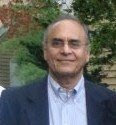What happens when creditors decide to pull out their money? It could happen in the form of gradual withdrawals or it could happen like a Bank run. I believe the time to panic is now rather than when there is a run.
Khusro
The problem actually started in the mid eighties when the US within a very few years turned from being the largest creditor nation to the largest debtor. Consumer overspending financed by mounting foreign debt (then called the ‘ Twin Towers ’). One result - the stock market crash of 1987 and a shakeout in the financial markets.
Now the debt has grown hugely, but by a strange twist the creditor nations- BRIC ( Brazil , Russia , India and China ) and the larger oil producing countries are more hostages to the US than the other way round. They cannot shift much of the reserves. No country is economically large enough and everyone (incl. the most likely candidate, the EEC with their Euro) is unwilling to allow their currency to be used as a reserve currency.
So the creditors are stuck with the US $ and they will resist a precipitate decline in the US $ or any kind of run.
Of course, there is a desperate search for investment diversification (by the creditor nations) which bodes well for some developing countries, e.g. massive real estate, incl., more recently, agricultural land in Pakistan
Regards
Kemal Shoaib
"Since 2001, the US share of world gross domestic product has fallen from 34 per cent to 28 per cent, while that of the Brics has risen from 8 per cent to 16 per cent. China’s reserves have rocketed from $200bn to $1,800bn, Brazil’s from $35bn to $200bn, Russia’s from $35bn to $500bn and India’s from $50bn to $300bn. World oil consumers have transferred more than $3,000bn to exporters. Because of America’s very low savings rate and heavy reliance on credit, US consumers, companies, financial institutions and the federal government must borrow heavily from these countries. The dollar now has a world-class competitor, the euro, which accounts for nearly 30 per cent of all international currency reserves, a proportion rising fast. And US trade, especially with emerging economies, is climbing as a portion of GDP, with fast-growing exports now giving the economy a desperately needed boost."
There is an unmistakable trend of wealth shifting from West to East. For the time being the Creditors might be hostage to the US but that is a matter of time as alternate markets start developing. A crisis of confidence in the US is helping to accelerate the search for alternates. The seven years since Sept 11 or the seven years of Bush, whichever way you want to look at it have decimated the US Economy, but in truth the decline has been going on for much longer. With every passing day, my prediction, that the Dow will soon hit 11,000 and the Euro will soon equal 2 dollars, is coming closer to realisation.
Khusro
Capital Flow From Emerging Nations To U.S. Poses Some Risks
By Michael M. Phillips
Word Count: 979
Washington
The U.S. has long depended on the kindness of strangers to finance its import bill. These days, those strangers are likely to be in China , Brazil , Mexico or some other emerging nation.
The U.S. has to import, on net, almost $2 billion in capital a day to cover its enormous trade gap. Of the $920 billion that foreigners pumped into U.S. stocks, bonds and government securities last year, $361 billion -- a stunning 39% -- came from emerging-market nations, according to calculations by Bank of America, using Treasury Department data.
China alone accounted for 21 percentage points of the ...
....Foreigners earned an average annual return of 4.3% on their US Investments, while Americans earned 11.2% on their Investments overseas. .... "They're probably questioning the efficiency of our financial markets"....
..Further more , the US finds not only dependent on money from the developing world, but in large parts dependent on money from Governments- and undemocratic ones.
